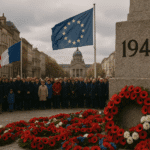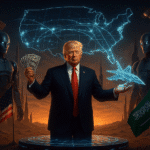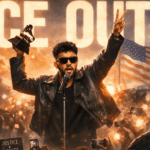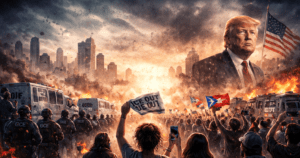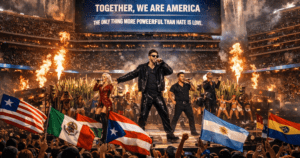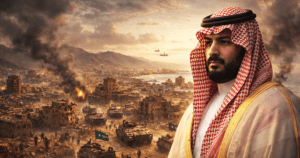In Riyadh, under the chandeliers of diplomacy and the polished glow of Emirati and Saudi ambition, Donald Trump delivered more than a speech — he delivered a veiled indictment. Of Washington. Of Brussels. Of Davos. Of every Western capital still convinced that they can export values like they export commodities, still drunk on the illusion that lectures build nations.
“The gleaming marvels of Riyadh and Abu Dhabi were not created by the so-called nation builders, neocons or liberal nonprofits…”
This wasn’t just regional flattery. It was a mirror — held up to the West, daring it to look. Because in Trump’s framing, the modern Middle East, built on sovereign ambition and unapologetic cultural identity, is not the troubled student of Western liberalism. It is the cautionary tale’s counterexample. And if you read between the lines, it’s the West that’s beginning to look dangerously lost.
From Exporting Democracy to Importing Chaos
Trump’s criticism lands hardest on the “nation builders” — the architects of failed experiments from Kabul to Baghdad. But his subtext is darker: what happens when those same ideologies that failed abroad are imported into the West?
Islamist opportunists, many of whom once thrived in the ideological vacuums left by Western intervention, are no longer hiding in the margins. They are now professors, protest leaders, DEI consultants, and think tank fellows. They speak the language of justice while holding contempt for the very liberties that make justice possible. This is the new colonial inversion — not the West civilizing the periphery, but the periphery rewriting the West’s own civil code.
In places like London, Paris, and parts of the U.S., we now see imported absolutism cloaked in liberal tolerance. Sharia activists masquerade as civil rights advocates. Islamist ideologues use identity politics to gain institutional leverage. Every time a Western university cancels a speaker for offending religious sensitivities, the lesson is clear: the West is no longer exporting ideas. It’s importing conditions.
The Freedom Paradox: When Speech Is Free, But Truth Is Costly
Trump’s speech taps into this very tension. He praises Gulf nations for preserving their traditions while building modernity — a fusion the West increasingly views as incompatible. In Europe and America, “freedom of speech” has become an open battlefield. On one end are those who defend it as sacred; on the other are activists and bureaucrats who treat it as conditional — valid only if it offends no one, especially not the loudest minority.
Islamists have weaponized this hesitation brilliantly. By blurring the lines between criticism and hate, faith and law, identity and immunity, they have turned free speech from a right into a liability. A cartoon, a tweet, or a university lecture can now trigger not debate, but cancellation — or worse, a national apology.
What Abu Dhabi demonstrates — ironically — is that authoritarian clarity often protects societies more effectively than liberal confusion. In Riyadh or Abu Dhabi, no one is confused about the boundaries of speech, national identity, or who sets the tone. But in London? Berlin? New York? The West is now a place where truth walks on eggshells and ideological predators roam free, protected by ambiguity.
Immigration Without Integration: A Western Blind Spot
Trump’s speech also casts light — without naming it — on another fracture point: immigration without assimilation. The Gulf states are masters of selective immigration. You may arrive, you may work, you may even thrive — but you do not rewrite the national narrative. There is no confusion about who is the host and who is the guest. The line is firm. Civilizational integrity is non-negotiable.
In contrast, the West treats immigration not just as a humanitarian policy, but as an act of moral purification. To question it is racist. To regulate it is fascist. To demand integration is imperialist. And yet, the effects are palpable: no-go zones, parallel societies, and ideological enclaves where Sharia replaces civic law, and imams wield more authority than elected officials.
The irony? The very ideologies the West once tried to reform “over there” are now being hosted “over here,” and treated like cherished guests.
The Arabian Way: Vision, Not Victimhood
Trump closes with what may be the most unapologetically honest — and yet most revealing — line of all:
“You achieved a modern miracle the Arabian way.”
What is the “Arabian way” here? It is not theocratic domination. It is not neoliberal mimicry. It is order with vision, tradition with ambition, identity with direction. And most provocatively, it is a rejection of Western guilt politics.
The West today is governed by apology — for its past, for its values, for its success. The Arabian capitals Trump applauds are governed by assertion. They do not ask to be liked. They ask to be respected.
The message is clear: The future belongs to those who know who they are. Not those constantly apologizing for who they were.
Final Thought: A Mirror or a Warning?
Trump’s Gulf address should not be dismissed as regional pandering or political theater. It is, in many ways, a philosophical intervention. It positions the Middle East not as a “student of democracy,” but as a successful alternative to the ideological chaos infecting the West.
If the West continues to allow radical ideologies to co-opt its institutions, and if it continues to confuse openness with self-erasure, it may soon find itself envying the clarity it once tried to lecture.
And the final twist? What was once “the East” may soon be the last guardian of order — while “the West” debates itself into oblivion.
Exporting Chaos, Importing Collapse: Trump’s Rebuke of Western Delusions

Leave a Comment

